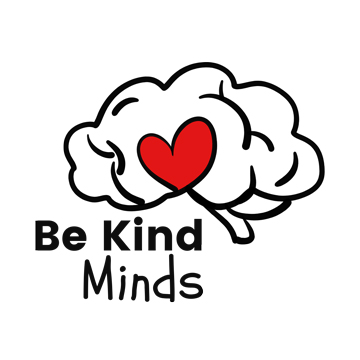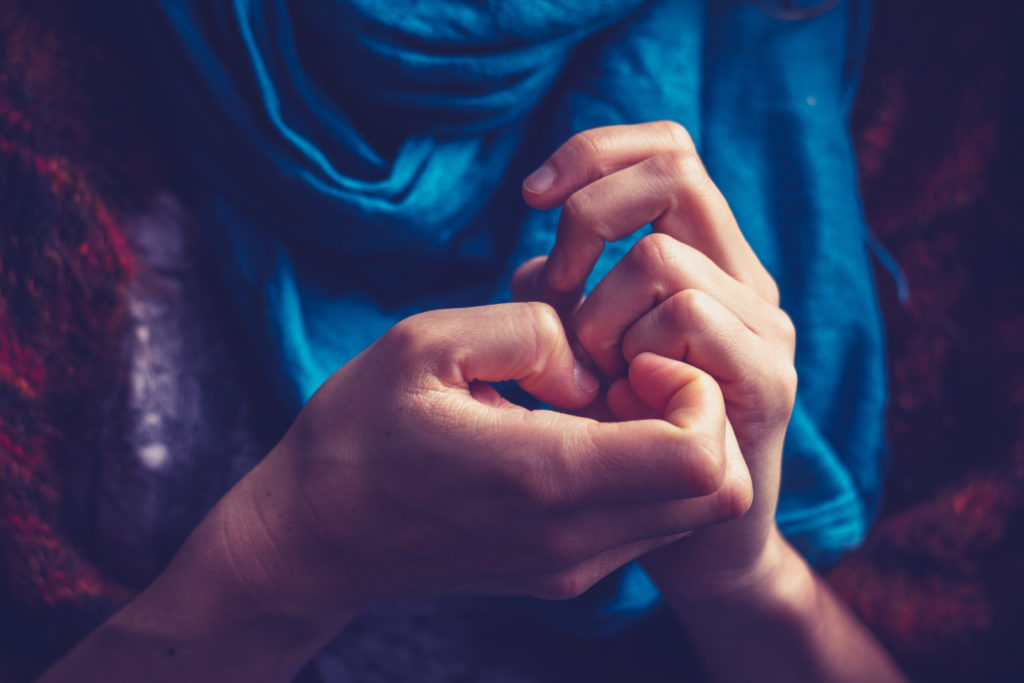“I don’t even know why I’m doing this.” … sound familiar?
If this behavior seems challenging to stop, because it ‘just happens’ without you, or their knowing, you’re not alone.
For over 30% of Americans, and more worldwide, nail biting and skin picking is a common body-focused repetitive behavior to “self-soothe”— tune out the world and try to avoid the negative emotions in our body. The body is trying to regulate itself when its triggered by emotions of stress & anxiety. The clinical term for this behavior in the medical world is called “Onychophagia“.
Studies recently have found this behavior can be genetic (have you noticed others in your family/extended family pick or bite their nails or skin, twirl or tug their hair, bite or suck on their hair, or similar ‘odd’ behaviors?).
Onychophagia might be a sign of anxiety , and is also thought to be a symptom of other mental health disorders such as ODD (Oppositional Defiant Disorder), OCD (Obsessive Compulsive Disorder), or even ADHD (Attention Deficit Hyperactivity Disorder). If the behavior is only mild and doesn’t produce much harm to the body, it could be behavioral only and likely not connected to any mental health condition at all. It would still be worth discussing this behavior with your pediatrician / family doctor.
If Left Untreated
Q: When is nail biting a problem that needs medical attention?
Cleveland Clinic – “Nail Biting: When Does It Go Too Far?“
A: If nail biting causes physical harm and psychological distress, then professional treatment is necessary. Usually, the person knows the behavior is problematic, but they can’t control it on their own. It is important to seek help if the behavior is affecting mental and physical health.
Parents of children who are exhibiting this behavior are in a tough position, because as the parent you will never not be a part of what triggers their stress. They want to please you, impress you, do whatever it takes to make YOU happy! They want to meet your expectations wherever possible. From the moment they are born, they look and study your every facial expression to learn what makes you happy and will try to figure out how to keep that expression on your face… and learn what makes you sad or mad, and try to avoid that.
So when they pick or bite their nails and skin, and do so unknowingly, it’s their body’s way of ‘taking care of their own stress’ instead of asking you for help. Children don’t like that their hands look the way they do, but their body is reacting on its own to ‘survive the stress’. Their body goes into self-preservation mode when it feels like it’s under attack [too much stress] and it needs to regulate itself back into a ‘safe zone’.
If this behavior worsens, the consequences could lead to the following risks:
- Over time the persistent picking & biting can lead to hangnails and open sores… you can pass germs from your mouth into your skin leading to infections.
- If biting or sucking on your hair progresses into swallowing your hair (yes, this does happen), the hair can accumulate into a very real cat-like hairball that can be life-threatening.
Other conditions that can be a result from this behavior:
- Abnormal looking nails…
- Fungal Infections in the nail plate & surrounding skin…
- Chronic illnesses due to passing bacteria & viruses from your fingers to your face & mouth…
- Damage to your teeth; misalignment, chipping, dental resorption (causing loss of parts of your tooth)…
- TMJ – joint pain in your mandible (lower jaw) to your skull.
What’s the Solution? How Do I Stop This Behavior?
Because this behavior is triggered by the subconscious, it can be a challenge to stop it – but not impossible. It may take a combination of things to help break this harmful habit, or in the very least reduce its frequency.
Know the Triggers
It could be as simple as just being bored, or a physical abnormality that your OCD cannot handle such as a rash that’s too itchy, or a blemish on your nose that you feel compelled to get to the root of (ouch!). Sometimes the act of picking or biting feels [too] good, in which case therapy treatment would be even more important because if you are physically harming your body and it feels good to the point that it becomes an addiction – that’s a red-flag sign that the underlining issue goes much deeper than just ‘self-soothing’. To put it more simply, it shouldn’t feel good to the point you feel you have to physically hurt yourself.
Make it Less Tempting
1. Keep the Nails Trimmed! – If you’re a nail picker or biter, the longer the nails are the more irresistible they are to pick or bite. So keep them trimmed down to make them less tempting. Some people have said that when they have paid to have a manicure, it also made it less tempting to do anything to their nails because they had just paid a lot of money to have them look nice. So it may be worth the investment to get regular manicures.
2. Wear tighter clothes, long-sleeves, wear gloves, keep your hair short… If you can make it less convenient to access the source (more difficult to pull up your sleeves, not as easy to pull your hair to your mouth), you are less likely to indulge in mindless picking, biting, pulling, or sucking behavior.
Reward Good Behavior in Kids
Remember that your children want to always please you and are less inclined to reveal the bad things they do. Anything that they may be a part of that causes you stress, worry, or become angry, they will feel compelled to hide it. So if you can provide them with alternative solutions to keep their hands busy, and praise them when you notice they are using those solutions, you can strategically help them replace the harmful behavior with the good, and they will in turn feel like you are only noticing the good and not the bad! Win-win! 🙂
To start, you can let them know that you’ve noticed the marks on their nails, hands, arms, their hair, etc… You could mention something like:
“I’ve noticed __X__. I bet you probably don’t even know when you’re doing it, but I can imagine that it may help you feel better when your body gets feeling bored, nervous or stressed. Sometimes our body responds this way when those anxious feelings get too big. I have an idea that might help you feel good without leaving the marks on your body. Sometimes those marks can get bigger and make us sick, so I’d like for us to work together to help avoid that, OK?”
Every time you notice them using the healthier alternative, praise them! The more consistent you can be in noticing the good, the more you can help them disrupt the bad behavior and over time replace it with safer and healthier alternatives.
(*Important to note that while tangible rewards are fun for kids, like gifts, treats, stickers, etc… nothing is as fulfilling, motivating, and long-lasting pleasure as making your parent happy. So loving words and physical affection are the best kind of rewards for a child that they’ll always remember.)
Embrace the Fidget Devices!
Kids love wearing fun things, and it’s important to provide them options to occupy their hands so they are not left with their nails, skin or hair to play with. If they can wear it, or keep it in their pocket, they are more likely to obtain a ‘rewarding win’ by remembering to use the better option. If they ever forget to wear it or put it in their pocket, instead of calling out their bad habit, kindly remind them by showing them… for example, “Oh! look what I found laying out on your desk.” 🙂 You might also consider asking them occassionally if they don’t find it as interesting, if you notice they keep forgetting on a regular basis, and you can try something new.
These options can work just as well for adults as they do for kids, so if you need some help with keeping your hands and mouth busy, you might consider giving any of these a try.
➡️ Snap Bands & Fidget Bracelets
These could turn into a hobby where they can collect all different designs and colors.
➡️ Fidget Rings
➡️ Compression Wristbands
➡️ Fidget & Chew Sensory Necklace
➡️ Fidget Keychains (something they could clip on their belt loop)
➡️ Fidget Cube & Toys for Pockets
Other Ways to Help The Stress & Anxiety for Kids
Books
More books can be found on Amazon…
Therapy
SPD is one of a group of disorders that is related to obsessive-compulsive disorder (OCD).
Cognitive behavioral therapy (CBT) is a structured type of psychotherapy that aims to produce healthier behaviors and beliefs by identifying unhelpful thoughts and behaviors. A specialized type of CBT has been developed for SPD. This type of CBT includes more of the stimulus control techniques described above, as well as habit reversal training, in which individuals are taught to engage in a harmless motor behavior (like clenching one’s fists) for one minute when triggered to pick. Clinical trials have demonstrated that CBT for skin picking can be extremely effective. But because it is different than other types of CBT, it will be important to work with a therapist who is trained in treating SPD. You can find skin-picking experts at the TLC Foundation for Body-Focused Repetitive Behaviors.
– Dr. Lisa Zakhary, MD, Phd – Harvard Health – “Picking your skin? Learn four tips to break the habit“
If you found this article helpful, please share with your friends! 💚




















































